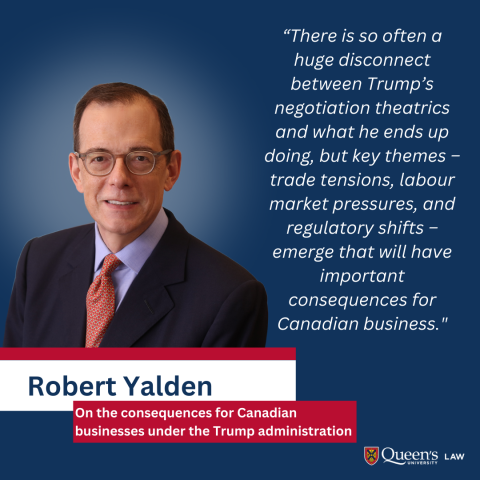
(With Donald Trump returning to the U.S. presidency, the international spotlight is once again focused on the White House. Queen’s Law experts share their insights on how the new administration’s policies could impact Canada and the world. In the first installment of this series, Professor Robert Yalden explores the implications for business policy.)
Making predictions about what will emerge from the U.S. under President Trump’s watch, and the implications for Canadian business, feels like the proverbial “fool’s errand”, not least because there is so often a huge disconnect between Trump’s negotiation theatrics and what he ends up doing in practice. But as one cuts through the bluster and media hype that accompany Trump, themes emerge that will have important consequences for Canadian business.
Let’s start with what is currently getting the most attention. Trump’s threat to impose tariffs on Canada has very little to do with allegations about the fentanyl and migration that may seep into the U.S. from this country. It is instead an opening salvo in what promises to be another round of tense trade negotiations, part of a recurring tug of war between two countries with very deep commercial relationships (over three-quarters of Canada’s total exports are now directed to the U.S.). For previous chapters in this saga, think FTA (1988); NAFTA (1994); and the USMCA (2020). After the 2020 deal was signed, many were so relieved that they lost sight of the fact that it was subject to review and potential termination in 2026. Recent threats are a reminder of that ticking time bomb. Canadian businesses operating in sectors of particular concern to the U.S. (e.g., lumber, steel, aluminum, the dairy industry) therefore need to plan for the disruption that will come as hardball bargaining tactics are deployed and as the U.S. and Canada try to hammer out changes to the 2020 trade deal.
Another theme that is getting plenty of attention is Trump’s determination to roll back immigration. That, combined with Canada’s own back tracking in this area, suggests that businesses will see pressure on labour markets across North America. Canadian companies looking to hire, including for their U.S. operations, face a very real risk that labour costs will rise.
Other matters have not yet made front page news, but risk affecting policy decisions of relevance to Canadian capital markets and to the growth of Canadian business. For example, Canadian securities regulators are wrestling with how best to regulate crypto issuers, crypto platforms and crypto traders. They have for some time also been working through potential new rules requiring Canadian businesses to provide enhanced disclosure on their climate emissions and diversity practices. Finding consensus domestically is hard enough, but the integrated nature of Canadian and U.S. capital markets means that our regulators also have to be alert to developments south of the border. A changing of the guard at the SEC (the U.S.’s securities regulator) is likely to lead Canadian regulators to adjust the pace of reform until they have better visibility on what their U.S. counterparts intend to do. The SEC’s efforts to implement climate change disclosure was already mired in court challenges and many are concerned that a new regime at the SEC will have little appetite to move this initiative forward, none of which will make life any easier for Canadian regulators.
Mergers and acquisitions (M&A) activity is another area to watch. U.S. business advisors are gearing up for what many think will be a reduction in regulatory obstacles to getting deals done (especially on the anti-trust front), which they expect will lead to U.S. business showing a renewed appetite to grow through M&A. But M&A history has taught us that when U.S. companies expand their reach and start buying large Canadian companies, concern about the loss of head offices has a knock-on effect on how Canadian governments think about what constitutes acceptable foreign investment, as well as about whether our business law framework adequately equips Canadian businesses to resist unwanted suitors.
Our relationship with the U.S. has never been simple, but it just got a lot more complicated.
Robert Yalden, the Stephen Sigurdson Professorship in Corporate Law and Finance, also specializes in corporate governance, mergers and acquisitions, and securities regulation. He received an Insight Development Grant from the Social Sciences and Humanities Research Council for his project, “Rulemaking in Canadian securities law: structures of deliberation and their implications for democratic legitimation.” This academic year, he is a Visiting Fellow of Wadham College, University of Oxford, and spent the 2024 fall term as a Senior Academic Visitor to the Commercial Law Centre, Harris Manchester College, University of Oxford.